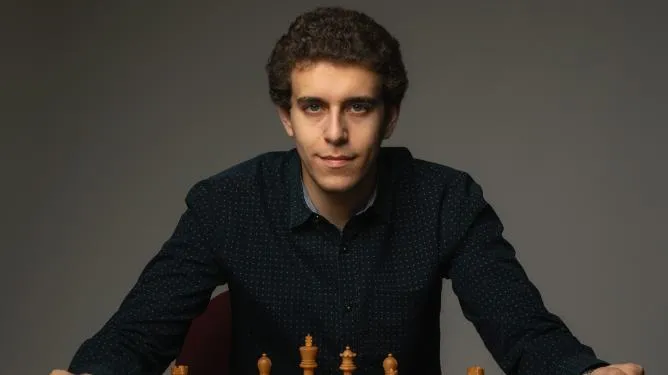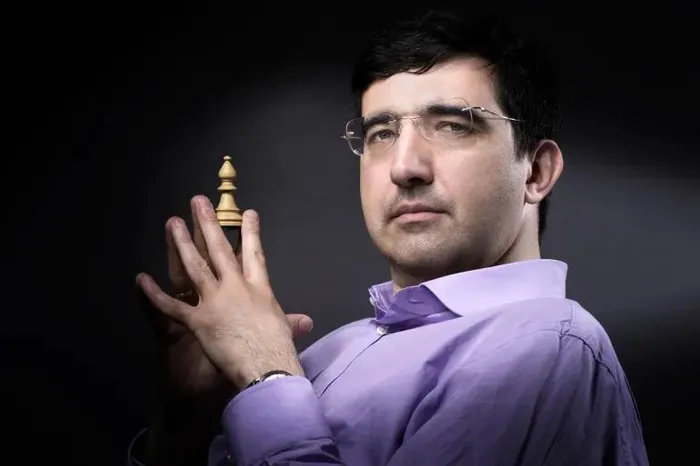A young chess star’s death, cheating accusations and a sport in turmoil

Daniel Naroditsky.
Image: Benjamin Robson/Chess.com.
Roman Stubbs
The final live stream of Daniel Naroditsky’s life had been broadcast for nearly two hours when the chess grand master put his head in his hands. His followers watched in silence. The 29-year-old rubbed his temples, sat up and began to play another game. “Deep breaths,” he muttered to himself. His eyes sagged, and he appeared to be drowsy.
“Daniel, you need to get off,” a friend in the room said.
“I feel like if I start doing well, people assume the worst of intentions. You know what I mean?” Naroditsky responded.
“I know what you mean, but you don’t have anything to prove to those people,” his friend said.
For more than a year, Naroditsky had been trying to prove himself after being accused of cheating by a former world champion, and after he finally logged off that final stream last month, he stayed up into the wee hours of the morning with his friends, in part telling them how much those accusations had been weighing on him, according to friend and colleague Peter Giannatos.
Later that weekend, Giannatos and another friend returned to Naroditsky’s home in Charlotte after he had not been responding to messages; they found him unresponsive on his couch. He was later ruled dead, and police are investigating the cause as a possible suicide or drug overdose, according to an incident report.
A former child prodigy who became an acclaimed player, commentator and teacher, Naroditsky, known as Danya, was a beloved and towering figure in the chess world - which has been shaken by his death and was forced to confront questions about the role of cheating accusations in the sport.
While it remains unclear how Naroditsky died, many in the chess community have pointed a finger at Vladimir Kramnik, a Russian grand master who for more than a year publicly questioned the techniques of Naroditsky and other top players - allegations that many in the sport consider unfounded. There also has been an outcry against the (FIDE), the sport’s governing body, for not doing enough to rein in Kramnik after his public accusations.

Russian chess grandmaster Vladimir Kramnik poses with his favourite chess piece (a bishop) on June 8, 2016 in Paris.
Image: Joel Saget/AFP
“It’s hard to equate what somebody says to somebody dying,” Giannatos said. “What I can tell you is that Kramnik’s accusations caused Daniel immense emotional pain, for a prolonged period of time, that he could not easily get over.”
The fallout of Naroditsky’s death has been a dark chapter for the sport, which boomed in popularity during the coronavirus pandemic to spawn lucrative tournaments and an online creator economy that transformed many elite players into internet personalities. But cheating, whether real or imagined, has loomed as an existential threat as the advancement of artificial intelligence chess engines has allowed some players to gain an advantage.
Kramnik, 50, won world championships each year between 2000 and 2007 and is considered one of the most prominent figures in the sport. He has called himself a “fair play advocate” and reportedly said he was not accusing Naroditsky of cheating, only raising “argumentized suspicion” about whether Naroditsky and other players were using chess engines to help determine their moves while playing online.
“I would like to express my deepest condolences to all of Daniel Naroditsky’s loved ones in connection with the tragic and untimely passing of this remarkable chess player and person,” he wrote in a statement after Naroditsky’s death. “... The subsequent attempts, immediately following his passing, to directly link this tragic event to my name … cross all boundaries of basic human morality, in my view.”
Last month, FIDE announced an investigation of Kramnik’s public statements made before and after Naroditsky’s death. Some players have pushed for a third-party probe, while others have called for a boycott of FIDE events. One petition, with more than 50,000 signatures, asked FIDE to strip Kramnik of his world titles.
Kramnik’s legal representatives in Switzerland did not respond to a request for comment. FIDE did not respond to a request for comment.
There also appear to be fractures between the governing body and the sport’s primary online hub, chess.com, on which Naroditsky built a robust and loyal following. The site imposed sanctions against Kramnik after his statements about Naroditsky and other players, according to Danny Rensch, the site’s chief chess officer.
“We did that in the face of criticism, which absolutely is probably the one thing that breaks my heart and actually makes me angry right now. … There were people who, I would argue, at FIDE, didn’t appreciate what this actually was in the modern world,” Rensch said. “We were accused of trying to control the conversation or censoring, and we were actually saying: ‘Absolutely not. This is crossing a real line, and this is not okay.’ And I wish that the governing body had acted sooner.”
Rensch met Naroditsky when he was a child prodigy growing up in California two decades ago. Naroditsky reached grand master status at 17 and quickly became a fixture in “bullet chess,” a fast-paced style of play that appeals to younger audiences and only grew as he established himself as a popular live-streamer.
Naroditsky regularly traveled the country for events, including to Atlanta to coach kids at a camp every summer. After graduating from Stanford in 2019, he honed his skills as a player, commentator and teacher, and he became known for lending a hand to players with lesser ability.
“A lot of chess elites judge you by your skill level. If you’re not one of their peers, they don’t even acknowledge you if you’re not writing them a check or something,” Giannatos said. “But Daniel wasn’t like that. He treated everyone with respect and as a human being.”
Naroditsky also was considered one of the sport’s foremost communicators, a rarity among elite players. He was a gifted writer who wrote a book as a teenager and penned online columns on the complexities of the game. As a streamer, he strove to be relatable and make the sport accessible to beginners.
“He took the most pride not in playing brilliant chess moves but in helping the game be understood by the masses,” Rensch said. “You’ve probably seen more comments online from people who say things like, ‘I never knew Danya, but I feel like I lost a friend.’”
Kramnik’s public anti-cheating campaign began in late 2023. In May 2024, he published a list of players he suspected of cheating, including Naroditsky, on his X account.
Other players had felt the weight of being accused of cheating by Kramnik, including David Navara, a Czech grand master who denied Kramnik’s accusations and said he sought a psychiatrist after the episode.
“I was shocked and angry,” Navara wrote. “My sleep and concentration were affected heavily.”
Kramnik himself once faced cheating allegations. During a 2006 world championship match, Bulgaria’s Veselin Topalov and his team accused Kramnik of cheating after using the bathroom frequently; after the insinuations, Kramnik refused to play the fifth game of the 12-game match and forfeited it. Kramnik went on to win the match.
Other cheating scandals have plagued the sport, most notably in 2022, when world champion Magnus Carlsen withdrew from a tournament after indicating he found the play of his opponent, American grand master Hans Niemann, suspicious. Niemann had admitted to cheating online as a younger player but denied having cheated against Carlsen. FIDE investigated the claims, which ended in a minor sanction against Carlsen.
“When you’re in a legal environment where you have to respect multiple boundaries, things go slowly. On social media, things go quickly. And that’s now what we’re facing,” said Ken Regan, a University at Buffalo professor who is an expert in anti-cheating in chess and an adviser to FIDE.
Rensch helped chess.com develop a powerful cheat detection system capable of shutting down thousands of anonymous accounts cheating with engines every day. He has adjudicated hundreds of cheating cases, some of which involved the world’s top players.
Still, it can be difficult to prove when a player is cheating. While some detection systems can monitor when players use a different application online while playing, others rely on models to detect the quality of a player against the errors in a game to determine whether a computer engine is being used. But not all players agree on how those models should be deployed.
“This is a massive issue,” Rensch said, noting that cheating accusations can take a major toll on a player’s livelihood and well-being. “... There are millions of dollars in prizes, and there are even more millions of dollars in the streamer and creator economy, which means … your reputation really matters in those circles.”
While most of the chess community believed the allegations against Naroditsky were unfounded, Giannatos said, Naroditsky told some close friends that a few players had questioned his honesty in the wake of Kramnik’s accusations, which tormented him more. Even standout performances in competition could not ease the burden.
Over the past year, Naroditsky had pulled back from streaming and was seen online less often. It was clear to some who knew him that he was not himself during his final stream, when he spoke at length about how the allegations affected him. Within the first hour of the stream, he talked about his legacy.
“If I knew some of the most influential movers and shakers of the chess world would carry the notion that I am a completely morally bankrupt individual, that would represent the complete failure of everything … my reason for waking up in the morning,” he said.
By the second hour, as he appeared more tired and emotional, he begged his friends to play a few more games, vowing to log off when he was next defeated.
“Next loss,” he said. “Maybe that’s never.”